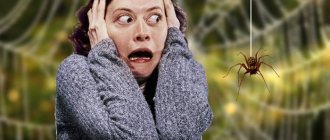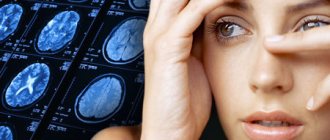The so-called “ancestral memory” makes people afraid of the dark. Firstly, the instinct of self-preservation is triggered, since danger may, purely hypothetically, lurk in the darkness. Secondly, a person intuitively avoids everything unknown, and in the darkness he loses his main analyzer - vision. So it’s quite normal not to walk down a deserted and unlit alley at midnight; startle from loud, incomprehensible sounds during sleep; not falling asleep for a long time because of watching a horror movie. But sometimes the fear of the night becomes irrational, far-fetched, groundless and subjugates a person’s will, thoughts and emotions. In such cases, a diagnosis is made - nyctophobia.
Causes of pathology in adults
Nyctophobia is common among people of different ages and social groups. The pathology affects 10% of the planet's inhabitants. However, people with fear of the dark or phobia rarely turn to a specialist. They neglect this problem.
In adults, fear of the night occurs for many reasons. Main:
- "memory of ancestors" People of primitive times were “programmed” to be afraid of the dark. In the subconscious there is a clear connection between darkness and danger. It was at night that primitive people were attacked by predatory animals, enemies from enemy tribes, and robbers;
- genetics. Children often inherit the fear of darkness from their parents. According to a number of studies, 50–75% of children whose fathers or mothers have a fear of the dark suffer from pathology;
- excessive impressionability. Impressive natures vividly imagine the dangers associated with darkness - robberies, accidents;
- severe stress caused by a sharp deterioration in vision. The eyes - organs that help to see danger and navigate the area - cease to function normally in the dark;
- fear of loneliness. Night sharply intensifies it, this leads to scotophobia;
- fear of dying. Death is subconsciously unequivocally associated with darkness. Therefore, the pathological fear of dying gives rise to scotophobia. This fear is common;
- psychological trauma that a person received at night or in a dark room. For example, I fell and broke my leg while going down the stairs in the evening. Or was robbed while returning home late;
- pop culture that exploits human subconscious fears. In emotionally immature, mentally unstable individuals, an “overdose of horror films” and an ordinary crime chronicle can cause fear and fear of the dark.
Fear of the dark in children
Children's fear arises for the following reasons:
- fearfulness of the child, strong attachment to parents, overprotection. When (at 2–3 years) the mother teaches the baby to sleep separately, he may first develop a fear of the dark. Such fear is born of “loneliness”, a feeling of insecurity, and the absence of a mother nearby. The child goes to the parent’s bedroom and asks his mother to “come back”;
- excessive impressionability of the baby, tendency to fantasize;
- subconsciously “stuck” fear of fairy-tale characters. Often parents themselves become the cause of the problem when they scare their naughty children with hedgehog grandmothers and little gray tops. The imagination of children brings to life imaginary creatures, which gives rise to phobias.
Remember! In single-parent families, children are much more likely to suffer from a phobia of darkness.
Children's fear of the dark is more treatable than adults' fear of the dark. The child grows, and often the phobia goes away on its own.
To help your child overcome the problem:
- Support your child morally, do not call him a coward. Humiliation will make the situation worse.
- If your baby comes to the bedroom at night, calm him down and put him to sleep.
- Read a good fairy tale without scary characters before going to bed. This will help the baby sleep. Remember! It is better for your child to refrain from watching TV before bedtime.
- Leave the door to your baby's bedroom open if it makes the baby feel calmer.
- Let's sleep with our favorite bear or pet (dog, kitten).
The child will not feel abandoned, lonely, and will no longer be afraid. With a favorite toy or pet, it will be easier for the baby to fall asleep. He will never need to know what his phobia of darkness is called.
Additional recommendations
What do psychotherapists recommend to nyctophobes in order to somehow reduce the level of anxiety and improve the quality of life:
- Do not watch horror films, do not read creepy and dark works, do not listen to scary stories.
- Don't look at your news feed in the afternoon.
- Breathe more fresh air, exercise, eat right - lead a healthy lifestyle.
- Communicate with pleasant, positive people.
- Don't allow bad thoughts.
- Do yoga, meditation, breathing exercises.
- Arrange the interior of the apartment in light colors. All rooms should have good lighting.
- Listen to pleasant music.
- Before going to bed, give up gadgets.
- Leave the night light on while you sleep.
Most often, a nycphobe is not able to cope with a scourge alone. He needs help and support from loved ones. Therefore, the latter also need to follow some recommendations of psychotherapists:
- do not enter into arguments with a nyctophobe about the fact that his fears are stupid and unfounded;
- do not ridicule his suffering;
- do not focus on the phobia;
- don’t force yourself to overcome your fear;
- Don't treat him like a patient.
Treatment should be comprehensive: work with a psychotherapist + self-reflection + help from loved ones. As practice shows, 2-3 months of such collective work are enough for a complete recovery.
Symptoms of Scotophobia
There are many symptoms of fear of the dark. Among the most typical it is worth highlighting:
- severe tachycardia, when the heart is pounding “like crazy”;
- panic attack, feeling of unbearable horror (due to a sharp surge of adrenaline);
- a sharp rise in pressure (“labile” transient hypertension);
- attacks of stuttering, shortness of breath;
- tremor (involuntary trembling) of the jaw, lips, limbs. The symptom appears along with severe chills;
- “cotton”, unruly, buckling legs;
- feeling of weakness, stiffness of muscles;
- severe dizziness leading to fainting;
- excessive sweating;
- severe migraines, pressing, pulsating type headaches;
- stomach cramps, paroxysmal intestinal colic. When the body is under psychological stress, the stomach temporarily stops digesting food. This causes pain;
- chronic insomnia, nightmares.
A terrified person may begin to:
- scream loudly;
- fall into hysterics - start rushing around the room, wringing your hands in despair, tearing out the hair on your head;
- abruptly start running to no one knows where;
- hide in horror in a corner, disconnect from what is happening.
Severe cases are fraught with:
- full-blown paranoia. There is a certainty that the person is being persecuted and wants to cause harm;
- pseudohallucinations. An imagination that gets out of control will “create” monsters and maniacs, and a person will begin to “see” them. You will need the help of psychiatrists.
How is nyctophobia different from simple fear?
Having a fear of the dark is, first of all, a lack of self-confidence, a strong fear of uncertainty and the unknown. This is why people with nyctophobia often suffer from anxiety disorder, are terrified of new things, and are afraid of change.
You should learn to clearly distinguish between fear and phobia. It is common for everyone to be afraid. Fear of the dark is not always a sign of pathology. It is often simply a manifestation of the natural instinct of self-preservation. Therefore, you need to constantly engage in introspection in order to clearly understand whether a person experiences natural fear, or whether his consciousness is enslaved by a pathological phobia. To distinguish them:
- ask yourself why you feel sick when it's dark. If there is a more or less clear answer to this question (for example, when it is dark, it is easier for thieves to get through), then this is fear, not phobia. When fear is pathological, it is difficult for people to clearly answer why darkness causes attacks of terror;
- Nyctophobia (like other phobias) differs from natural fear in its extreme degree of obsession. A person suffering from the disorder will never be able to distract himself from fear. No amount of logic and common sense will help you overcome fear. The fear will only pass if the darkness disappears.
How to get rid of it?
To clarify the diagnosis, you need to make an appointment with a psychotherapist. If it is confirmed, a strategy and tactics are developed on how and with what to treat nyctophobia. Of medications, only sedatives and sleeping pills are prescribed.
What psychotherapeutic methods are used to get rid of a phobia:
- psychoanalysis;
- Gestalt therapy (if the cause is childhood trauma);
- Rational Emotive Behavioral Therapy;
- art therapy;
- play therapy;
- hypnosis;
- cognitive behavioral therapy.
The most effective way to rid children of nyctophobia and scotophobia is fairytale therapy. The psychotherapist tells instructive stories involving those monsters and fears that frighten a child in the dark. It could even be role-playing games. Gradually, the realization comes to him that this is all made up, which means it’s not scary at all.
The disorder can be overcome on your own if you use the following techniques and techniques.
- Self-reflection
The technique is performed in the first half of the day. Ask yourself: “Why am I afraid of the dark?” On a separate sheet of paper, write down your fears. Re-read each point and evaluate how real and dangerous it is for you. You will see that most of the reasons are completely unfounded. Dispel the myths and convince yourself that nothing threatens you at night.
- Evening rituals
Write down your evening in detail after dark. These should be clear, daily rituals that the body (brain, consciousness) will soon get used to and stop panicking when night falls. What actions are welcome: listen to calm, relaxing music; take an aroma bath with soothing herbs; drink a glass of warm milk; read something good and bright; play with your pet. All this relieves stress and prepares for a good, full sleep.
- Switching
Develop a specific algorithm of actions for what to do when an unaccountable wave of fear begins to roll in. For example: turn on the lights everywhere; Drink a glass of warm water in slow sips; open the window to ventilate the room; call a friend (boyfriend) or go to the neighbors to distract yourself. Write down these step-by-step instructions on paper or on your phone and keep them within reach at all times.
- Confidence
Tell someone that you suffer from scotophobia or nyctophobia. There's no shame in this. Let this be a person you trust, who will never reproach you for being sick, who will not mock you and who will not tell anyone about your problem. It's important to talk to someone.
- "Kill the Monster"
What scares you most often in the dark? If there are rustles or sounds, find their source and try to eliminate it. Noise from the street - install soundproof windows. The cat wanders around the house - for the sake of your own peace of mind, give it to someone you know and keep some fish in the aquarium. The clock is ticking loudly - replace it with others. If, when night comes, monsters are seen in pieces of furniture (hangers, mirrors, ironing boards, curtains), remove these things so that they are not visible from the bed. Or arrange everything so that the lighting falls on them differently (sometimes it is precisely this that distorts the silhouettes beyond recognition).
Independent use of the techniques and methods described above is quite possible, but not always effective. Only a psychotherapist can professionally tell you how to get rid of nyctophobia and fear of the dark forever and in the shortest possible time.
Why can’t you do without treatment for nyctophobia?
The pathology should be treated. Otherwise the disease will cause:
- diseases of the gastrointestinal tract (ulcers, gastritis);
- problems with the heart, blood vessels;
- severe mental disorders.
Fear of the dark dramatically worsens the quality of life. Disturbed sleep makes it difficult to concentrate on work.
To overcome nyctophobia, people resort to simple “self-medication” - turning on the light. However, this solves the problem only temporarily - the phobia remains in the subconscious. In addition, the lighter it is, the less the body secretes the sleep hormone melatonin. It's difficult to get a good night's sleep when the lights are on.
Consequences
If nyctophobia is left untreated, in children it develops into a full-fledged mental disorder by the age of 18. In adults, according to statistics, it is diagnosed in every tenth person. This pathology can have serious consequences for life and health:
- constant stress;
- stroke;
- heart attack and death as a result;
- schizophrenia, various psychopathologies;
- suicide;
- sleep apnea;
- irreversible changes at the chromosomal level, which lead to accelerated aging processes.
As practice shows, by the age of 50-60, nyctophobia disappears by itself. The exception is schizophrenia, which only worsens the course of the disease. Although people with this diagnosis rarely live to this age.
Nyctophobia (scotophobia) is a serious mental disorder that cannot be tolerated and must be treated by a specialized specialist. Otherwise, it will not only ruin the quality of life with constant stress and lack of sleep at night, but will also lead to severe cardiovascular diseases.
You may also be interested in:
Psychotherapy and other treatments
You cannot get rid of scotophobia on your own. Here you cannot do without psychotherapeutic help. It often has to be reinforced with pharmaceutical psychotropic drugs:
- antidepressants (reduce “permanent” tension);
- tranquilizers (calm anxiety, dull fear);
- beta blockers (suppress the production of the stress hormone adrenaline).
There are a number of effective psychotherapeutic techniques to help get rid of scotophobia:
- the most effective is hypnotherapy, solving a problem using suggestion. A competent hypnotherapist, such as Nikita Valerievich Baturin, who thoroughly masters the technique of hypnosis, quickly relieves the obsessive fear of the night and darkness;
- Cognitive behavioral therapy gives good results. During conversations with the client, the psychotherapist finds out the source of the fear of the dark and develops a winning strategy. The specialist teaches the client to “think in a new way,” to look at fear differently, to stop being afraid. Gradually, the psychotherapist “instills” pleasant associations associated with darkness;
- psychoanalysis is effective. The psychoanalyst talks with the client and together “gets to the bottom” of the causes of scotophobia. And then it helps to get rid of fear;
- Group therapy works well. People suffering from scotophobia get together, share their “painful problems”, and together try to find ways to solve the problem.
An unconventional practice, yoga, is considered effective. The main thing here is to find a specialist who can teach meditation techniques and breathing exercises. Soon the forced interest in why the fear of the dark appeared, phobia, as it is scientifically called, will evaporate.
Ways to Prevent Scotophobia
To free yourself from the fear of darkness before going to bed and fall asleep without problems:
- We try to relax, take deep breaths. We convince ourselves that the horrors lurking in the darkness are figments of our imagination;
- We do without horror stories, black stuff, and crime news. We listen to relaxing music, enjoy the monologue of our favorite comedian;
- If you don’t sleep well, it seems that there are strangers in the room, we get out of bed, touch the cabinets, shelves, bedside tables. We make sure that we are alone in the room;
- We use a night light that has brightness adjustment. We gradually reduce the brightness and get used to sleeping in complete darkness.
Examples from life
Anna, 31 years old
I was always afraid of the dark. And 10 years ago, late in winter, I was returning from exams through slippery streets. I almost fell when I was crossing the road, and suddenly the traffic light and all the lights went out. This scared me terribly. Then nyctophobia stuck in my head. It got to the point that I was afraid to go home from work. I read that fear of the dark is caused by what a phobia is called. I started looking for a “cure”, but didn’t find it for a long time. Until I got an appointment with Nikita Valerievich Baturin. Finally found salvation. Now I’m not afraid to walk in the park or city streets in the evenings. I feel much more confident and bolder.
When you seek help in time or take the advice of a specialist, you don’t need to ask Google: “ Fear of the dark, what kind of phobia is this ?”
Adviсe
It is important to do everything to feel completely safe in your home.
If the phrase “I'm afraid to sleep in the dark” is familiar to you, then these tips will be very appropriate.
- As night approaches, you need to calm down, use meditation or turn on soothing music, light scented candles, and take a bath with relaxing herbs. These methods will help reduce a panic attack.
- Try switching. Turn on a good movie or chat with friends. Having a pet is also a great option.
- If the fear of the dark is somehow connected with the fear of loneliness, then you need to be with friends or family at night, then it won’t be so scary.
- Try not to disturb your night sleep, do not sleep during the day.
- If you feel fear approaching, do breathing exercises.
- Watch your diet. Eliminate junk food four hours before bed. At this time, it is permissible to drink milk or eat some fruit.
- To make it easier to be in the dark, you can use some sound effects. These include instrumental sounds, the sound of the sea, birdsong, and the operation of a fan.
- If you are afraid that someone is hiding in the dark, then make your home feel safe. To do this, put bars on the windows, hang curtains, you won’t be afraid that someone is looking at you, keep an object near your bed that, if something happens, you can protect yourself with (this is necessary for your peace of mind).
- Ventilation of the room is of great importance. In a cool room, sleep is more restful and sound.
- Before going to bed, you should only have positive thoughts; you can watch a comedy film.
- If it seems that you are hearing some sounds, find a logical explanation for them, understand that it is from the neighbors or just the sound of the wind outside the window.











